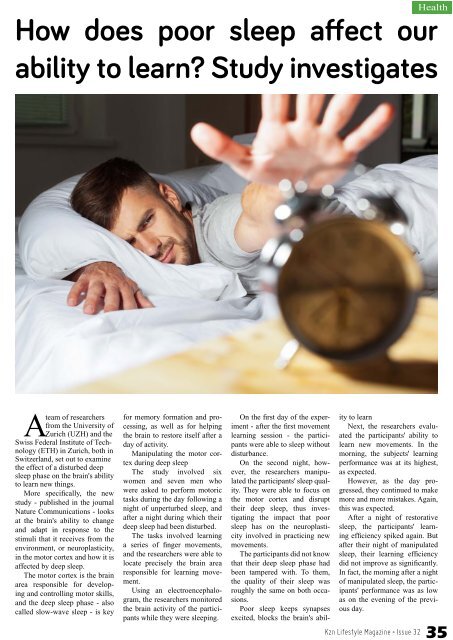KZN#32
Create successful ePaper yourself
Turn your PDF publications into a flip-book with our unique Google optimized e-Paper software.
Health<br />
How does poor sleep affect our<br />
ability to learn? Study investigates<br />
A<br />
team of researchers<br />
from the University of<br />
Zurich (UZH) and the<br />
Swiss Federal Institute of Technology<br />
(ETH) in Zurich, both in<br />
Switzerland, set out to examine<br />
the effect of a disturbed deep<br />
sleep phase on the brain's ability<br />
to learn new things.<br />
More specifically, the new<br />
study - published in the journal<br />
Nature Communications - looks<br />
at the brain's ability to change<br />
and adapt in response to the<br />
stimuli that it receives from the<br />
environment, or neuroplasticity,<br />
in the motor cortex and how it is<br />
affected by deep sleep.<br />
The motor cortex is the brain<br />
area responsible for developing<br />
and controlling motor skills,<br />
and the deep sleep phase - also<br />
called slow-wave sleep - is key<br />
for memory formation and processing,<br />
as well as for helping<br />
the brain to restore itself after a<br />
day of activity.<br />
Manipulating the motor cortex<br />
during deep sleep<br />
The study involved six<br />
women and seven men who<br />
were asked to perform motoric<br />
tasks during the day following a<br />
night of unperturbed sleep, and<br />
after a night during which their<br />
deep sleep had been disturbed.<br />
The tasks involved learning<br />
a series of finger movements,<br />
and the researchers were able to<br />
locate precisely the brain area<br />
responsible for learning movement.<br />
Using an electroencephalogram,<br />
the researchers monitored<br />
the brain activity of the participants<br />
while they were sleeping.<br />
On the first day of the experiment<br />
- after the first movement<br />
learning session - the participants<br />
were able to sleep without<br />
disturbance.<br />
On the second night, however,<br />
the researchers manipulated<br />
the participants' sleep quality.<br />
They were able to focus on<br />
the motor cortex and disrupt<br />
their deep sleep, thus investigating<br />
the impact that poor<br />
sleep has on the neuroplasticity<br />
involved in practicing new<br />
movements.<br />
The participants did not know<br />
that their deep sleep phase had<br />
been tampered with. To them,<br />
the quality of their sleep was<br />
roughly the same on both occasions.<br />
Poor sleep keeps synapses<br />
excited, blocks the brain's ability<br />
to learn<br />
Next, the researchers evaluated<br />
the participants' ability to<br />
learn new movements. In the<br />
morning, the subjects' learning<br />
performance was at its highest,<br />
as expected.<br />
However, as the day progressed,<br />
they continued to make<br />
more and more mistakes. Again,<br />
this was expected.<br />
After a night of restorative<br />
sleep, the participants' learning<br />
efficiency spiked again. But<br />
after their night of manipulated<br />
sleep, their learning efficiency<br />
did not improve as significantly.<br />
In fact, the morning after a night<br />
of manipulated sleep, the participants'<br />
performance was as low<br />
as on the evening of the previous<br />
day.<br />
Kzn Lifestyle Magazine • Issue 32<br />
35

















